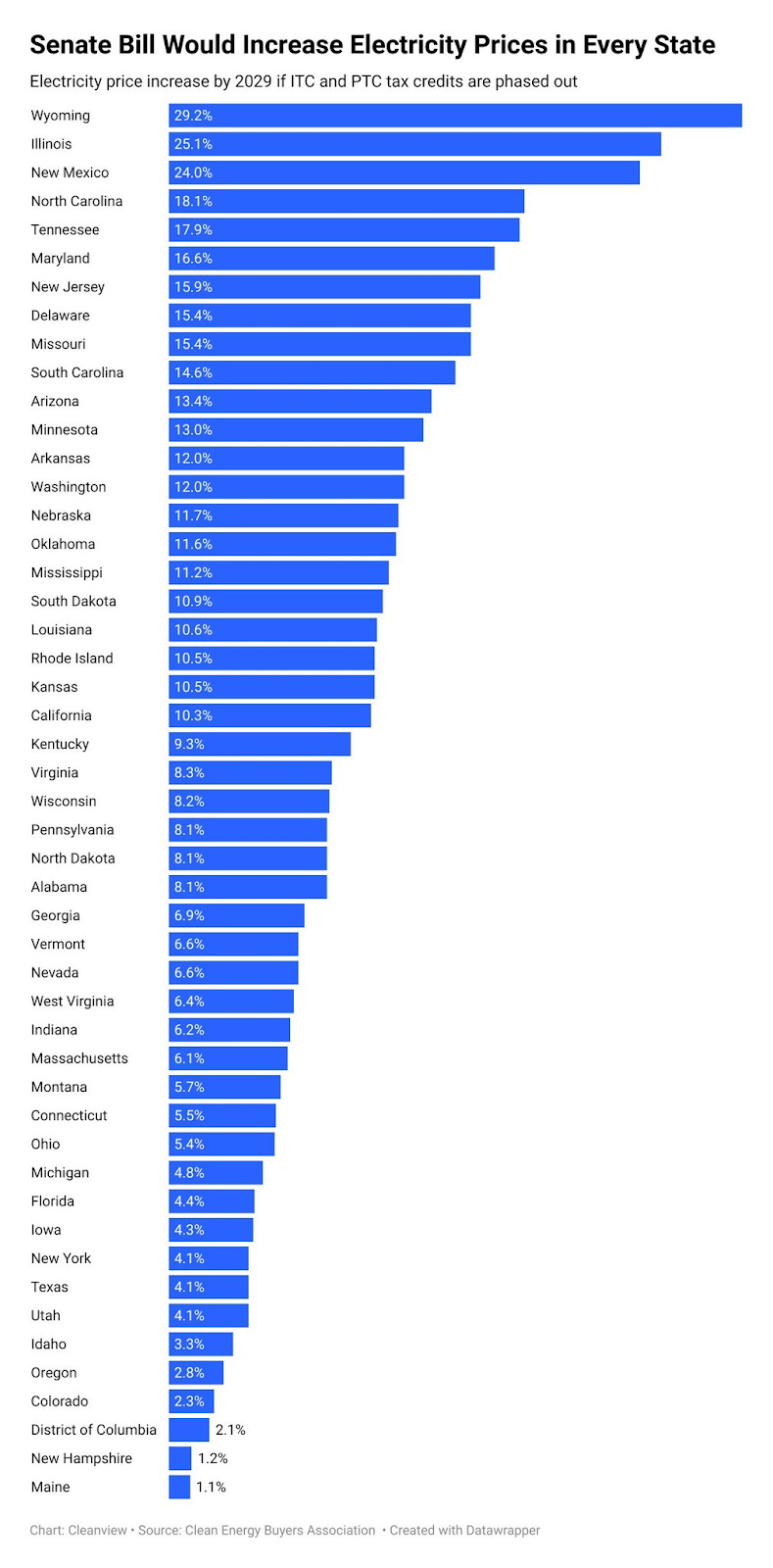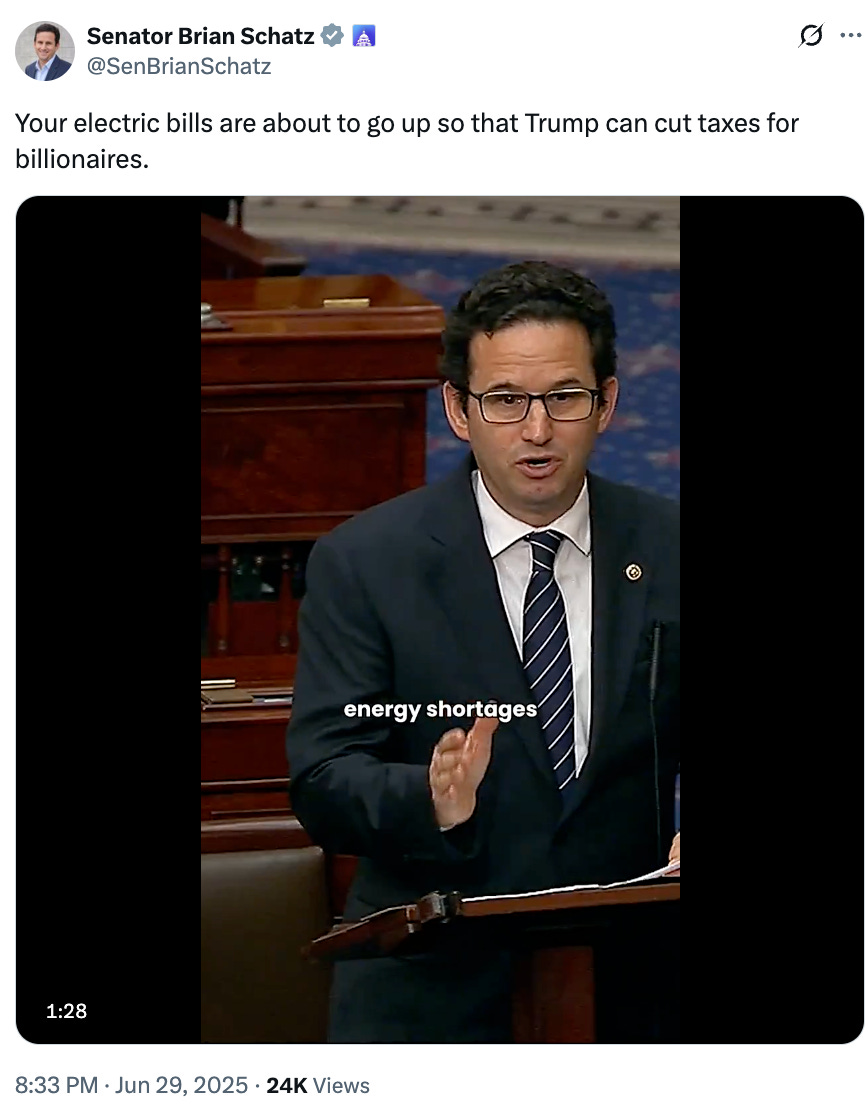What You Missed While the Senate Burned
While You Weren’t Looking, They Tried to Gut Medicaid and Raise Your Bills
If you took the weekend off from listening to the news, you probably opened your computer Monday morning to a whiplash of updates about the "One Big Beautiful Bill" (BBB). The U.S. Senate is in the midst of a dramatic vote-a-rama, slogging through dozens of amendments to this sweeping reconciliation package backed by Donald Trump and Republican leadership. The bill's fate remains uncertain as Republicans seek to hold their narrow majority together long enough to send it to the House before the July 4 deadline imposed by Trump. Keep in mind the bill itself is 940 pages long.
Behind the high-stakes theatrics lies a deeply controversial bill that reshapes America's healthcare, energy, and tax systems—largely to the benefit of the wealthy. The BBB slashes coverage, raises energy prices, deepens inequality, and wages a culture war disguised as fiscal policy.
The Hidden Medicaid Bomb
One of the most alarming aspects of the bill would be its focus on saving through reducing Medicaid, with new provisions stripping health insurance from far more Americans than initially projected. The Congressional Budget Office (CBO) estimated that ~16 million people would lose health insurance by 2034 under the base bill. But a new Joint Economic Committee (JEC) Minority analysis, incorporating Sen. Rick Scott's amendment that would trigger automatic Medicaid expansion termination in 9 states with "trigger laws" – paints a far bleaker picture.
Image Credit: JEC
The Scott amendment specifically targets the enhanced federal matching rate for Medicaid expansion, which would immediately trigger automatic program termination in Arizona, Arkansas, Illinois, Indiana, Montana, New Hampshire, North Carolina, Utah, and Virginia. In other words, the budget's healthcare cuts could increase coverage losses from 17 million to potentially 29 million - representing a massive escalation in the human impact of rolling back the Affordable Care Act's Medicaid expansion.
Hardest Hit: Low-Income and Vulnerable Communities
Behind these staggering numbers are real people – disproportionately those in vulnerable, low-income communities who can least afford to lose health insurance. Republicans insist they are protecting "truly needy" patients, but CBO's findings tell a different story: the bill would inflict "substantial harm to vulnerable beneficiaries, including children, people with disabilities, and elderly adults," according to the nonpartisan analysis. Many who gained coverage through Medicaid expansion are working poor adults - people earning up to about $36,677 annually for a family of three who previously made too much for traditional Medicaid but too little for employer coverage. In North Carolina, for instance, officials report that more than one-third of the state's 630,000 expansion enrollees live in rural communities, which would shoulder an "outsized impact" if expansion is rescinded. Nationally, experts warn that states with higher poverty rates rely more on Medicaid, so pulling back support will hit economically fragile states hardest - with the average job loss in the five highest-poverty states projected at 1.3 percentage points compared to 0.6 percentage points for the five lowest-poverty states. Those ripple effects extend beyond insurance status: losing billions in Medicaid funds could force hospitals, clinics, and nursing homes to close, many of them in rural and low-income communities, while increasing uncompensated care burdens as patients return to using emergency rooms as their primary care providers.
Raising Electricity Prices to Own the Libs
In case the Medicaid cuts were not horrifying enough, the bill also includes incredibly strange provisions that would harm any chance the U.S. would have to excel at innovating within the green tech sector, all while raising electricity prices. The legislation creates a new penalty system targeting renewable energy projects that use materials from China and other designated adversary countries, imposing heavy taxes of up to 50% on solar projects and 30% on wind projects when they exceed limits on foreign-sourced components. The bill simultaneously blocks tax credits for any companies with Chinese supply chain connections while cutting the manufacturing incentives that were meant to help build domestic alternatives, creating a contradictory policy that punishes companies for foreign sourcing without providing viable pathways to American-made components. This approach threatens to cripple the renewable energy sector at a critical moment when hundreds of billions in clean energy investments are already in motion, effectively sabotaging America's ability to compete in the global clean energy market while potentially driving up electricity costs for consumers and handing China even greater dominance in the green technology space.
Chart Credit: Clean Energy Buyers Association
As economist Noah Smith observes, this reflects how "Trump and the GOP leadership see their attacks on American energy supply as part of a culture war rather than purely economic policy," noting the "disingenuousness" of arguing that solar should "stand on their own" while simultaneously trying to "levy heavy taxes on them." Smith argues that "most of the GOP decided long ago that solar and batteries were some hippy-dippy [BS] that lefty activists were trying to force on America" and have "simply not reconsidered, looked at new evidence, or updated their belief in decades, even as advances in solar and battery technology have utterly changed the game." In other words, yes, they really are looking to increase electricity prices over a culture war that should have died and stayed in 2016.
How’s the offense doing?
Several key Democrats have stepped up to fight this legislation despite being in the minority. At the Rebuild, we believe in recognizing and amplifying the voices of politicians who stand up for what's right.
Senator Brian Schatz of Hawaii was busy on X highlighting the worst aspects of this bill, how it will impede economic progress, all while raising costs:
Watch here.
Senator Raphael Warnock of Georgia delivered an incredible speech on the disproportionate impacts: We are engaged in Robin Hood in reverse ... this is socialism for the rich."
Watch here.
Senator Tammy Duckworth has been active in highlighting that the fight is not over:
However, there is a lot more work to do. Nearly half of Americans are unaware of anything going on with the BBB, and only 8% have even heard of the Medicaid cuts! This is Trump's single most important piece of domestic legislation, and the impacts are so large that it's almost impossible to overstate the gravity of the situation. People cannot be outraged over something they have no clue is even occurring. Whether you are an elected official, staffer, or just a concerned American, it requires a collective effort to ensure that the message gets through to the leaders in power, who can then relay it to the people.
Image Credit: Priorities USA
The fight will carry on, and hopefully Democrats can take this atrocious bill as the albatross needed to unite the party and protect Americans in every state.










Nice write-up on the new BBB, a bill which, while it has some good elements, doesn’t pass the “progress” sniff test.
It is laden with more protectionist nonsense like this that, while ostensibly are claimed to improve supply chain independence, are actually designed to wage an ideological war on non-fossil fuel energy sources.
If the goal was supply chain independence, carrots are better than sticks. At least with a carrot, we could foster a positive environment that would accelerate production learning curves to accumulate advancement more quickly https://www.lianeon.org/p/the-experience-curve
Instead, this bill uses sticks, which are more likely to hinder every alternative energy source in one fell swoop.